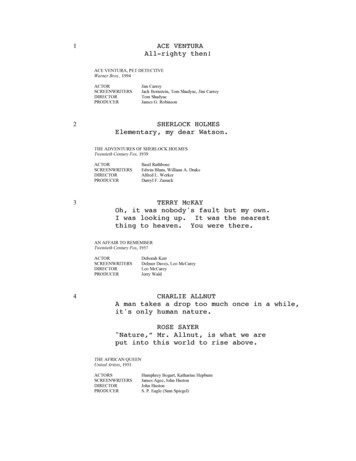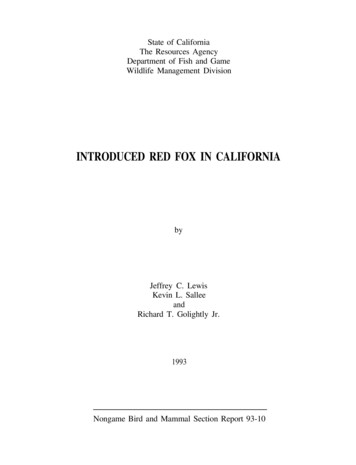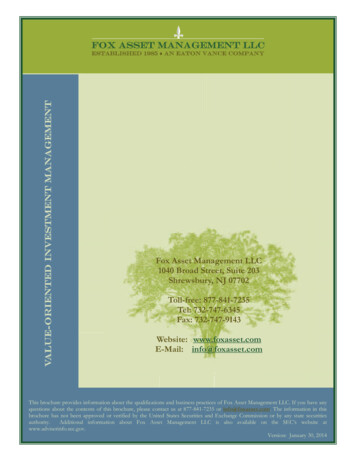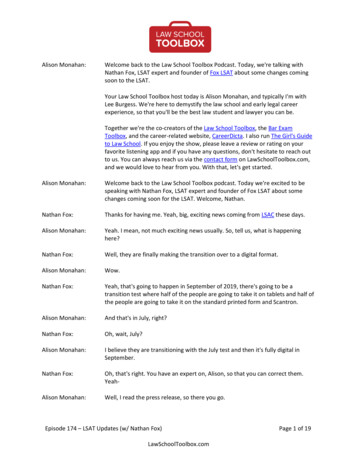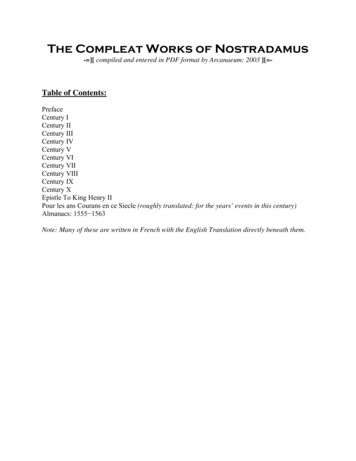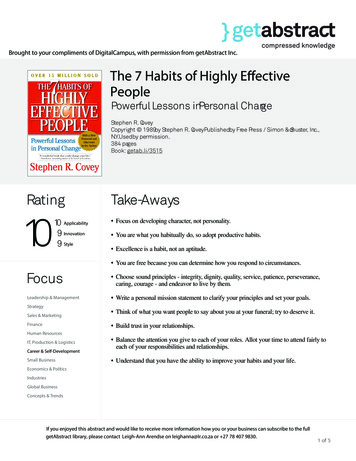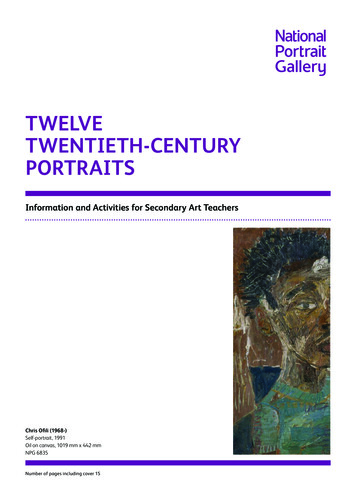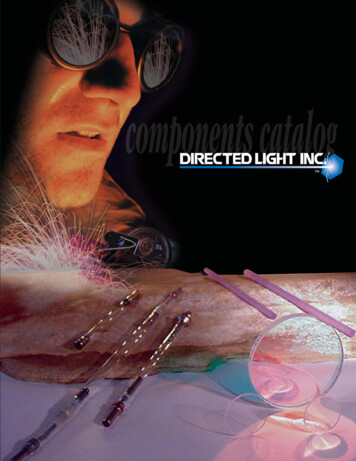
Transcription
TWENTIETH CENTURY FOX PRESENTSDIRECTED BY KENNETH BRANAGHSCREENPLAY BY MICHAEL GREENBASED ON THE NOVEL BY AGATHA CHRISTIESTARRINGTOM BATEMAN, LUCY BOYNTON, KENNETH BRANAGH,OLIVIA COLMAN, PENÉLOPE CRUZ, WILLEM DAFOE, JOHNNY DEPP,JUDI DENCH, JOSH GAD, MANUEL GARCIA-RULFO,DEREK JACOBI, MARWAN KENZARI, LESLIE ODOM JR.,MICHELLE PFEIFFER, SERGEI POLUNIN, DAISY RIDLEYPRODUCERSRIDLEY SCOTT, p.g.a.MARK GORDON, p.g.a.SIMON KINBERG, p.g.a.KENNETH BRANAGH, p.g.a.JUDY HOFFLUND, p.g.a.MICHAEL SCHAEFER, p.g.a.EXECUTIVE PRODUCERSADITYA SOODMATTHEW JENKINSJAMES PRICHARDHILARY STRONGDIRECTOR OF PHOTOGRAPHYHARIS ZAMBARLOUKOS BSC, GSCPRODUCTION DESIGNERJIM CLAYFILM EDITORMICK AUDSLEYCOSTUME DESIGNERALEXANDRA BYRNEHAIR & MAKE-UP DESIGNERCAROL HEMMING
CONTENTSIntroduction3About the Production:Everyone is a suspect4The Detective10The Gangster13The Assistant14The Butler14The Widow15The Missionary16The Professor17The Countess17The Count18The Princess19The Maid20The Governess20The Doctor21The Sidekick22The Train Conductor23The Red Herring23About the Production Design:The Production Design of Murder on the Orient Express24Shooting on 65mm25Building the Mountain26Moving to Malta28The Orient Express29Creating the Costumes32Background:Agatha Christie34Some world events in 193435Cast bios36About the crew502
INTRODUCTIONIn the most timeless of whodunits, MURDER ON THE ORIENT EXPRESS follows renowned detectiveHercule Poirot (KENNETH BRANAGH) as he attempts to solve what would become one of the mostinfamous crimes in history.After a shocking murder of a wealthy businessman on the lavish European train barreling its way westin the dead of winter, private detective Poirot must use every tool of his trade to uncover which of thetrain’s eclectic passengers is the killer, before he or she strikes again.Published in 1934, Agatha Christie’s novel, Murder on the Orient Express is considered one of the mostingenious stories ever devised. More than 80 years after its publishing, Christie’s novel remains belovedby new generations of readers. Kenneth Branagh’s stunning retelling of the beloved mystery with itsacclaimed ensemble and breathtaking visuals invites audiences to take the most suspenseful train rideof their lives.3
ABOUT THE PRODUCTIONEVERYONE IS A SUSPECTAgatha Christie’s classic mystery, with its richly drawn characters confined to a luxurious passengertrain, taut scenes and crisp dialogue, has fixated audiences since the novel’s debut in 1934. The Timesof London wrote upon its publishing, “The little grey cells solve once more the seemingly insoluble. Mrs.Christie makes an improbable tale very real, and keeps her readers enthralled and guessing to theend."Readers have been captivated with the mystery, the crime, the story, and the character of HerculePoirot for generations. The allure of the Orient Express was magnified by Christie’s work, and travelerscontinue to flock to discover the illustrious compartments and service to this day. Room 411 in the PeraPalace Hotel in Istanbul, where Christie allegedly wrote the novel, also remains a popular destinationsite. There are societies and clubs the world over dedicated to rediscovering Christie’s mysteries,particularly those featuring Hercule Poirot.Why the endless fascination?"Agatha Christie is expert at bringing depth (with economy) to the observation of characters, makingthem distinct and colorful, but also believable. I think she enjoys the literary dazzle of that, but in theOrient Express, you also have glamour. You have snow. You have elegance and the golden age ofromance in travel. And, of course, you have a murder,” says Kenneth Branagh. This film introducesanother generation of moviegoers to an enthralling new interpretation of one of the most belovedmysteries of all time. A “who’s who” of celebrated actors and an acclaimed production team up forthe journey.4
With everything Agatha Christie, it all starts with the story. But to make a film, of course, you then needto get the rights to that story – and for producers Mark Gordon and Simon Kinberg, that proved to bea near-five-year-long journey. Initially, both men had enquired about the rights separately but soondecided that teaming up would be the best approach.Gordon and Kinberg subsequently partnered with Ridley Scott. Now it was time to commission ascript As a huge admirer of Agatha Christie and long-time collaborator with producer Ridley Scott,screenwriter Michael Green (LOGAN, BLADE RUNNER: 2049) was thrilled when he was asked to bringthis fabulous story to the screen. Producer Scott, a Christie fan himself, and an admirer of SidneyLumet’s 1974 version of Murder on the Orient Express, had leapt at the chance to re-explore the book,seeing it a wonderful opportunity to present the author’s work to a modern-day audience. Greenagrees.“They're incredible stories with characters that you want to see more and more of,” says Green. “Andif you're lucky enough to catch an Agatha Christie book or play at the right age, it's going to stay withyou and remain charming in your memory."But even as a Christie fan, one story stands out for Green: "I'm very fortunate that my favorite AgathaChristie is, hands down, Murder on the Orient Express. It not only features Poirot, my favorite characterof hers, but it's a story that has a surprising ending, along with the fascinating people you meet alongthe way. The setting is grand and everything about it makes it stand apart in my memory as thespecial one."Green met with the Christie estate to discuss the project: "We all had the same goal: we wanted tobring it into the modern world without changing what's essential to it, without altering its soul, so that acontemporary audience can experience it, believe it and be thrilled by it."For Green, his interpretation of the classic murder mystery came together when Kenneth Branagh(HENRY V, CINDERELLA) came on board: "Probably the most exciting day in the development processwas finding out that Ken was interested in directing and starring in it,” says Green. “I have immenserespect and appreciation for him, both as an actor and a director. Suddenly, this hypothetical script Ihad written became a film - one I could now imagine through Ken’s lens and the caliber of the peoplehe would attract to the project.”5
Great-grandson of Agatha Christie and Chairman of Agatha Christie Ltd, James Prichard, agrees withGreen: "I have watched Ken's films since I was very young - I watched his Henry V as part of myuniversity degree, and to have him on this film, an incredibly talented director and one of the bestactors of his generation, to have someone of that quality want to play Poirot gives me an enormoussense of pride."Known for his love of classics, Kenneth Branagh was a perfect fit from the start. "Fox knew that I lovedthrillers, and so they came to me with this most classic of thriller mysteries,” recalls the actor/director. “Ithink maybe they even knew I liked trains - I certainly liked this title, 'Murder on the Orient Express'. It'salways had a special sort of ring to it and it takes you to the golden age of travel. It's also a characterpiece set in a very confined space, under tremendous tension. There are very interesting disparatecharacters interacting about the most profound and dangerous of subjects and themes. I read thescript by Michael Green, and I was really taken by it."With no shortage of interpretations of Christie’s work, Branagh’s desire to revisit these charactersstarted with the depth and compassion Green mined, as well as the exploration of the darker idea ofthe motivation for revenge."Michael Green clearly loved the material, and he loved the characters. He wasn't trying to get easylaughs, and he wasn't poking fun at the characters - particularly Hercule Poirot,” said Branagh. “Therewas a compassion in the screenplay, and one of the things that surprised and thrilled me about thefilm is that it's much more an emotional experience than people might imagine. This goes deeperbecause, it explores grief, and loss, and revenge, with sophistication and soul.”Then there is the setting. For modern audiences, travel has become a hassle, a means to an enddestination. The setting of Orient Express harkens back to the care and precision given to travel, andthe true luxury of the experience. Green’s script captured the allure of the time and the meticulousdetails of the famous train."Michael relishes in the golden age of travel and the attention to detail in the Orient Express, the train,as well as other people's appreciation of it,” says Branagh. “We both experienced that sort of childlikesense of excitement about being able to cross Europe in this wheeled palace, with its confined spacesthat also make you think certain things could go bump in the night. So, his feeling for the piece, bothfor the emotional depths and colors in it, the sense of fun and excitement, where it exists, and therespect for the material, along with certainly the desire to entertain - all of that came winging off thepage. His screenplay felt very rich to me."6
Not only was Branagh excited at the prospect of working with Green’s script, he was also very keen tocollaborate with the Agatha Christie Estate: "Mathew Prichard [Christie's grandson] and JamesPrichard [Christie's great-grandson] were two of the first people I met when I came on board for theproject, and this very particular connection was very important to me. Mathew grew up with AgathaChristie, and James is not only a family member, but a very smart, creative influence in the way thatestate is run, and a very good collaborator. We all feel that Agatha Christie work is in a very potentmoment of evolution. She has already made this massive contribution to the world's entertainment yetshe is being rediscovered as someone who has touched on areas of human experience that haverelevance for today. She continues to entertain, and make us think in a different way."On the relevance of the story, James Prichard explains: "To me, Murder on the Orient Express is one ofthe cleverest stories that Agatha Christie wrote. There is an astonishing exploration of justice, andjustice was very important to my great-grandmother, and there are elements to this story that I thinkare unique, and that go to the core of what makes this story so powerful. The back-story is incrediblymoving and challenging, and the way Poirot deals with the whole episode is extraordinary."Mathew Prichard, adds: "It's a mixture of all sorts of things. The glamour, the originality of the story andthe outrageousness of the solution. It was a brilliantly written book in the 1930’s and I think it's hard toremember nowadays, how original it must have seemed then. My grandmother traveled in thatdirection, and she stopped off in Istanbul on her way to Syria and Iraq, so for Christie lovers, it has asense of genuine authenticity of where she used to go herself."For Green, it was the first time in his career where he would develop a script with someone who is boththe director and the lead actor. "Together, we would be thinking not only of how it would be shot, buthow he would want to play individual moments. We could look at a line and discuss the tone and thecamera angles, but also, I could hear him read it directly to me and I would be able to shape the linesinstantly for him. It was a very interesting and efficient process and takes out a lot of the guessworkwhen the director is the one who knows precisely how the lead actor is going to be speaking thewords."Branagh explains why it was a natural fit for him to direct and play Poirot: "It felt that there was a wayin which those two things were very congruent with one person doing the same job. Because,crucially, I think, Hercule Poirot is a director. He directs the characters, and like a director, Poirotintuitively tries to listen to the way in which he can be specific and bespoke about how to create themood that's required for each interrogation.”7
As a director, the concentration that Branagh would have on all of these amazing actors, and thedetail of performance was exactly what Poirot had to have, as he looked for the tell-tale signs of theculprit, which, as Christie points out, is often “Poirot observing just the flicker in an eye.”“Poirot’s a master of observing body language,” said Branagh. “It’s not someone with an object. It'swhat somebody does with an object. It's the way they eat, or what they leave, or what they don't say,or what constitutes humor. And from his own alleged separate perspective, he often uses this notionthat because he's a Belgian, he's separate, and he plays up to a sense that other people have of himas being different, some might say, eccentric, because when they're saying that, they'reunderestimating him."Oscar-nominated actor Johnny Depp was intrigued by how the story felt relevant and fresh. “It’s goteverything you might expect from Agatha Christie,” said Depp. “Death, murder, interestingcharacters, an unusual, often glamorous situation - all of those elements, inside a wonderful locationand journey, are all there. But I was really impressed to return to it and see how it hadn't dated, and,in fact, it had reinvented itself, I think, which is a sign of very good storytelling."Oscar-nominated actor Willem Dafoe was drawn to the script for its character-driven narrative: "Forthis story, it's the tone that's so important, and the role of Poirot is interesting and beautifully written, asare the balance of the characters. It has a nice edge and it's fun, but it also has a moral dilemma atits center.""All of the major plot points are there,” says Leslie Odom, Jr., “but it's really told for a modern audiencewho has seen everything and heard everything. How do you excite these kids? How do you makethem lean forward in their seats when they've seen so much? I think Ken and Michael have done areally great job with that aspect of the script."The style, grace and romance of Green’s script and the writer’s ability to stay faithful to the essence ofthe story, while updating it for a modern audience, enticed the acclaimed cast. Explains ManuelGarcia-Rulfo: "It has the same DNA as the novel, but it's more dynamic." Lucy Boynton concurs: "It wasa perfect balance between a modern version of it, whilst also staying true to all that is sacred inAgatha Christie's story. That was a really exciting element, to see the way that it had beendeveloped."When Josh Gad first read the script, he immediately knew he wanted to be involved in the project. Heexplains: "I got about twenty pages into the script and called my agent and I said, 'I don't care if Ihave to play an usher who's taking tickets, I need to be a part of this film, it's extraordinary.' To me,8
something this smart, something this epic, something that almost harks back to the golden age ofHollywood cinema, as an actor but also as a cinephile, was really exciting."The other big draw was the opportunity to work with the esteemed Branagh. “What's so great aboutKen is he comes to it with the perspective of being one of us,” said Gad. “He's an actor, first andforemost, and so he understands the questions we ask ourselves, the insecurities we may have, and heis able to speak to those questions with the authority of somebody who has been in our shoes."Dafoe sees many similarities between Branagh's work as a director and his role as Poirot. He explains:"The role of the director is paralleled by the role that Ken is playing in the story, because as the directorhe's the circus master who sets the scene and tells everybody what they need to know going forwardin the story. A similar thing happens in the story itself, as Poirot really takes hold of the situation anddirects the events."A longtime collaborator with Branagh, Derek Jacobi, thinks what makes Ken a very good director isthat he's an actor first. “The number of balls he keeps in the air is just mind blowing, but I've alwaysadmired his ability to perform and then cut himself off and look at himself objectively. I find thatextraordinary, says Jacobi.” “It's quite amazing to see what he does because his eye and his mind areeverywhere at once."Oscar-winning actress Penélope Cruz was also impressed with Branagh’s ability to seamlessly movebetween directing and playing Poirot. "What he's doing with the performances and the camera isreally powerful and I feel like he's making a film that will get into our brains in a way that is going totrap us, like some strange magic,” said Cruz.” "It's like this amazing dance that seems so easy for him,which is very rare and all of us are shocked and blown away by how he can be so present. We aresuch a big cast and he has so much responsibility."Adds Tom Bateman: "Branagh is an incredible company leader, he's a wonderful director, but as anactor, it feels to me is where his energy is and his blood is. He wants to be there and you can feel itwhen you're acting in a scene with him. He gets so excited to be there which is very comforting, andyou almost don't see him directing because he does it so effortlessly."9
THE DETECTIVE (Hercule Poirot – Kenneth Branagh)The beloved fictional detective, Hercule Poirot, is one of Agatha Christie’s most famous characters,appearing in 33 novels and over 50 short stories, Poirot was key to ensuring the film worked. AgathaChristie Ltd Chairman James Prichard explains: "I first read the script quite a long time ago, and what'sinteresting is that things have changed, but the overall tone and flavor of the script have not. From thestart, screenwriter Michael Green got that right, particularly Poirot, he really understands Poirot and it'svery clear that he does in the script. There are changes and differences, particularly in his look, fromwhat one might have seen before, but the essence of Poirot is there and that to me is incrediblyimportant."Branagh’s preparations to play Poirot were extensive and included reading all of the Poirot novels. Hebegan a year ahead of the shoot with a birthday present of a paperback First Edition - The MysteriousAffair at Styles.Fittings for his bespoke suits started nine months ahead of shooting. The most time-consuming elementwas the exact thickness and angle of the knot in his tie, and its perfect reproduction every time hewore it. This required three months of experiment with fabrics, starch and a good deal of patience.He was also measured and fitted for handmade shoes, wearing them in over a period of threemonths.The actor also gathered all written descriptions of Poirot’s moustaches by Agatha Christie, using theextensive resources of the Agatha Christie Estate. After which began the nine-month process ofresearch and development for the requisite face furniture that would live up to what Miss Christiedescribed as "the most magnificent moustaches in all England".Branagh even revisited the work of famous Belgians including the surrealist Magritte, and Hergé, theauthor of TinTin. He listened to recordings of 27 different Belgian accents by gentlemen of Poirot’s agespeaking in English, and met with a dialect coach three times a week to study and practice Poirot’saccent. These included the occasional Skype sessions in his Garrick Theatre dressing room during hisperformance as Leontes in Shakespeare's The Winter’s Tale.With Branagh committed to play Poirot, he and Green discussed how to accurately hone the multifaceted character. As Green explains: "We wanted to work out how to make him quirky and strangeand odd and loveable in all those ways that he is, that make him so memorable and beloved. Butalso, how to make him feel like somebody who could really exist in this world." He continues: "Wewanted to make it thrilling, and to feel genuine unease and tension. Poirot can be seen as a comedic10
character, but in very serious circumstances, and part of our approach was to show that contrast.Poirot is used to being ahead of the game, in control of the situation, and in this story, he meets a casethat is beyond his understanding at that time."Green's affection for Poirot is evident in the script and he explains why: "What I always love about himis that he's very smart, very funny and very peculiar. If you can weave all those things into hisinvestigation then you have wonderful scenes, as you can make his particularity and peculiarity bewhat turns his interview with a suspect, so that he can find the piece of information that he needs. He'salso an incredibly fun man to frustrate, because he is so perfect and particular, that when he is offbalance, he becomes incredibly interesting. That's what ignites him and sets him off."Hercule Poirot has been described by Agatha Christie in a variety of ways throughout her work. AsKenneth Branagh observes: "She had fun evolving him and not being too strict about rules she mayhave set. Occasionally, I think she was frustrated by him in that he was her most popular creation, butI think she learned to love him again and again and again. His distinguishing feature is his kindness,and it's often repeated how kind he is. He is also very fastidious, both about his personal appearance,but particularly about his immense and magnificent moustache. A touching piece of vanity thatChristie often reports on, and that Poirot acknowledges. She also is quite wry about suspecting that hishair color may not be entirely natural, and may have been helped out by various unguents. Hissharpness of mind and his clear brilliance as a detective is something that she makes no bones about.His ability to see detail, and particularly, to see human psychology in depth, and with nuance, I thinkshe enjoyed. She clearly had that as an individual herself. She makes a lot of snap judgments aboutpeople, in her life, in her letters. She herself travelled widely, and she was a very independent-mindedperson, and very, very observant. So, she gives all of those qualities to Poirot."The design of Poirot's moustache was a key component in finding the character. Branagh says: "Ittook many months to design the moustache - Carol Hemming [Hair and Make-Up Designer] wasbehind it, and she came up with a brilliant reference. We began with this line of Agatha Christie'swhere she referred to Poirot as having the most magnificent moustaches in England. So "moustaches"was a clue. We know she meant it in the old sense, but Carol's idea was that there should almost bethis double-moustache effect. It had to be, because Christie kept using the words "majestic,immense". It was almost like a mask. It was Poirot's superpower. It kept people at a distance. Itneeded to be in itself, structurally and luxuriously pleasing in appearance, and it needed to make abig impression. It had to, because the story and the characters' reactions to him in the story and manyother stories needed that."11
Following the initial design stage, they started testing the moustache on Branagh. It was a challengingtest per Branagh’s recollection: “We kept asking does the mustache do what it needs for thecharacter, every single time? And in a murder mystery with a man like this, the moustache is doingquite a lot of thinking for you, quite a lot of the time. So, we knew it was a tremendously importantsubject."The man must suit the clothes, and the clothes must suit the man. On his costume, Branagh comments:"Poirot would not be a dandy in the sense of extraordinary colors, or a massive number of clothes or aconstant change of outfits, but he would be extremely precise, and we knew that the tailoring of all ofthe suits (there aren't so many, because he's travelling) would be precise and crisp, and that was aconstant process of readjustment. We spent a lot of time thinking about what he would do with hishands - would he use waistcoat pockets, how much would he use the cane, what height would thecane be. Everywhere there was something that you might expect from the period, like a watch, anda watch chain, it was made very specifically, and everything had a Poirot-ish specificity. The samewent for the way he tied his ties, the degree of the knot, just like the moustache, he would be insistenton where they sat, and for it to be the same every single day."Much like the character is fascinated by alignment and perfection of symmetry, the creation of Poirotbecame like a classic timepiece: distinct, clean and with the utmost precision. "We were looking for animmensely precise, cultivated, crisp, clear, clean look, and finding in those cuts, and in those colors, atimeless kind of elegance," offers Branagh.Costume Designer Alexandra Byrne’s impeccable eye for this precise look dramatically enhancedPoirot’s presence on screen. "The first discussion was about the moustache, so that started with Kenand Carol Hemming and helps to define the character,” says Byrne. “Then I joined in, with Ken beingvery keen that Poirot had a military background. We did a lot of research on what that meant, to bea Belgian with a specific military background. We worked towards his vanity being a “vanity ofprecision” rather than a peacock vanity— we felt that Poirot would have developed a style of suit thatworked only for him. He's not interested in fashion - he has his style, he has his tailor, and that's who hegoes to. He has two suits and an evening suit, which is about right for a man of his class. They'rebeautiful, they're honed down to the precision of what he feels is right, and there's this absolutesymmetry and tidiness, so that when he's in a fight and his collar gets disarranged or a button comesoff, that is deeply distressing and unacceptable to him."In bringing Branagh's version of Poirot up to date, there was room to make him more nimble thanprevious incarnations. Equally cerebral. But with a touch more brawn and agility. Enter StuntCoordinator, James O'Donnell: “I spent some time thinking about how we could get Poirot involved in12
the action without making it stand out too much with an audience,” recalls O’Donnell. Having spokento Ken, I wanted Poirot to be an Aikido master with a cane, which was someone who was masterful,not only with the way he analyzed and interpreted crime, but even in the way he fought. He wouldn'tgo fist to fist, he would be clever, like David vs Goliath, which fitted in well with the character."THE GANGSTER (“Edward Ratchett” – Johnny Depp)While many of the characters in the film are grappling with the lines between good and evil, Ratchettis seemingly the one inherently evil character on the train. "Ratchett is a gangster, a small-timegangster, it seems, who is on the train with his secretary and his butler,” says Kenneth Branagh. “Hehas money, but he does not have peace of mind.”Ratchett is disturbed and unsettled, as someone is after him, and he becomes aware of it through aseries of provocative notes, threatening messages that are found on the train. He seeks Poirot's help,and it is not an easy conversation between him and Poirot. In turn, audiences can see Ratchett is notgoing to have an easy journey on the Orient Express.“From the second Ratchett enters the story, you can sense his paranoia and his urgency to befriendPoirot and protect himself,” says Depp. “The elegance of the train, the gangster swagger of Ratchettcombined with his greasy confidence culminate into an extremely compelling and amusing characterto play.”Branagh describes Depp as bringing: "A wonderful, seedy glamour to this very sharp-minded, clearlydangerous, and clever mobster. Johnny's performance is dark, it's dangerous, and it is very funny."“In many ways, he’s the antithesis to Poirot, which makes their exchanges so tense,” says Depp.“Ratchett wants the respect of Poirot, but he’s never going to get it.”RATCHETTYou’re the world-famous Hercule Poirot. Avenger of the innocent. Isn’t that what they call you in thepapers?POIROTAnd you are an innocent?RATCHETT (laughs)You’re fun.13
“Johnny Depp oozes charisma and charm and confidence and is the loveliest, sweetest and most funco-star you could imagine,” offers Josh Gad. “And then he can turn on this character like Ratchett,who's the complete opposite in every way, and it's incredible to watch. It's become an expectationnow, that every time Johnny creates a new character, you're so excited to see what that's going tolook like. Each one has so many layers, physically and vocally— he's able to identify it so specifically."THE ASSISTANT (“Hector MacQueen” - Josh Gad)Hector MacQueen is Ratchett’s secretary and a very nervous individual. He is well-traveled andscholarly, trained as a lawyer, and fluent in many languages, but is not a happy man, and prone toexcess. “He seems to drink and smoke a little more than is good for him, and he seems unsettled,”says Branagh.The role was a departure for Gad who understood the dynamic between MacQueen and Ratchett."MacQueen is a complicated guy,” says Gad. “He's got a story which seems fairly obvious, but thenthere’s what's going on behind all that. He is sort of a slave to Ratchett. He is a trembling, insecuresecretary to this rather abusive boss who expects a lot of him, and demands even more."“Josh has a fantastic naturalism in the part. We know how funny Josh can be, and of course he's verymusical as well,” says Branagh. “Here, he plays something with great simplicity and vulnerability.McQueen is someone who feels, in some way, as though some damage or some wounds haveoccurred in his life, that, Josh, in the performance, seems to wear very lightly. It makes him veryintriguing, and it makes the little trio of Ratchett, Masterman, and McQueen a very tight-knit but alsoconflicted group. They are an electrifying trio."In talking through the character with Branagh, Gad explains how much back story was necessary totruly embody MacQueen. "We went into great detail about who this guy is, what his upbringing was where does he come from? How has he gotten to this place? The beauty of this film is that you thinkyou know what you know, but you don't know anything. And MacQueen is just one piece
Mathew Prichard, adds: "It's a mixture of all sorts of things. The glamour, the originality of the story and the outrageousness of the solution. It was a brilliantly written book in the 1930's and I think it's hard to remember nowadays, how original it must have seemed then. My grandmother traveled in that

